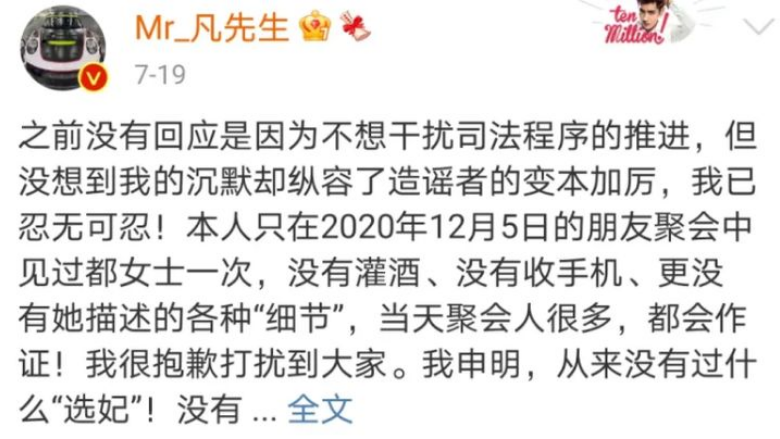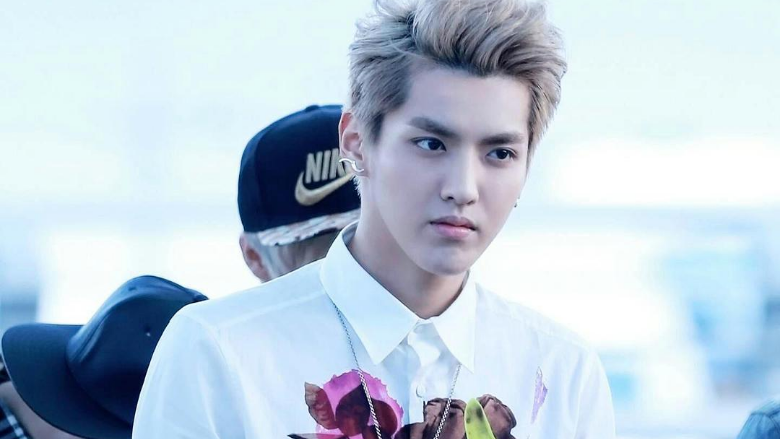Many super fans on China’s social media platforms have abusive behaviour when they come to the aid of their favourite celebrities. But are celebrities and their teams partly responsible for driving this anti-social abuse online?
Rosy Chu covered her ears, attempted to insulate against the song that was playing in the cafe, the music used to accompany her to sleep, but now it only evokes unhappy memories for her.
“I could never have imagined that one day I would be ashamed of having supported a celebrity,” said Rosy Chu, 23-year-old. She used to be a fan of Kris Wu, never missed any of his concerts, but now these concert tickets have been torn to pieces and thrown in the trash can.
In August, Kris Wu was arrested on suspicion of raping underage girls, a celebrity became a criminal.
“But some of his fans still abused victims online, even planned to break him out of prison,” said Rosy. She showed some comments that fans wrote under the accuser’s Weibo post, filled with curses, swearing words.

To regulate the chaos caused by his fans, Sina Weibo, the social platform equivalent of Twitter in China, closed 789 fan groups and 990 accounts that abused other users or governmental agencies maliciously.
“These crazy fans dare to insulted victims, neither the celebrity himself nor his team can shirk their responsibilities,” said Rosy, she recalled another incident that happened earlier with Kris Wu and his team.
“This isn’t the first time that he tarnished the reputation of a young girl. Last year, he was taken a picture by paparazzi about holding hands with a girl,” said Rosy, she found a piece of news report about this event, in the picture, two people were walking in a dimly lit garage, but Wu’s face is recognizable.
“However, he did not admit to this affair at all, he and his team led fans to believe that the girl in the photo expose this picture deliberately for being famous,” said Rosy. But many fans at that time believed this excuse, blamed that girl and abused her on Weibo.
On Weibo, apart from some celebrities and their teams will frame others for bad things, there are also some celebrities and entertainment companies that will lead fans into unfair competition and even provoke flaming wars.

“It looks like some fans are supporting a celebrity sincerely, but actually they are paid by the entertainment company for leading fans’ opinions. They are ‘professional fans’,” said Sherly, who worked as a Fans Operation in an entertainment company for about three years.
“Some of these professional fans run independent Weibo accounts, post all kinds of entertainment news daily to attract followers. It seems that the operators of these accounts don’t have a specific celebrity to support,” said Sherly. She also mentioned that almost all entertainment accounts on Weibo with more than 500,000 followers have celebrity teams invested in them.
“But when there is bad news about the celebrity who invest them, these accounts will quickly follow the instructions taught by the PR team to clarify, also they will post some rumours about other celebrities to distract attention,” said Sherly. For these Weibo accounts that drove vicious competition and offered malicious guidance to fans, the Cyberspace Administration of China (CAC) has started to close them up.
By September, Weibo had banned five entertainment accounts to post for 90 days and cleaned up 131 posts with malicious content.
The second category of professional fans is the management staff of large fan clubs. “Usually, the Fans Operation in an entertainment company, like me, will talk to these professional fans privately about some work they should do,” said Sherly. The work ranges from cooperating with the company to promote the celebrity image to stimulating fans to spend money or vote for celebrities.
“For example, our company will buy a ‘Trending’ (similar to the ‘Trending’ chart on Twitter) for the celebrity on Weibo, these professional fans have to drive other fans to promote this trending. If the celebrity endorses a product, professional fans will show their purchasing receipts on Weibo and encourage other fans to follow their examples,” said Sherly. Many fans are convinced of the identity of these professional fans.

Because of their high status in fan clubs, other fans tend to trust them and believe that what they said and did will be good for the celebrity’s development, then they will imitate these professional fans.
The reason why celebrities and their teams spend so much time and money on Weibo are that the public image and influence on Weibo are tied to their benefits.
According to the data from the entertainment company, the cost of having a first-rate actor for advertising endorsement in China is around 10 million yuan. Industry insiders even said that Kris Wu’s advertising endorsement fee could be about 20 million yuan.
However, how can celebrities make brands believe that they can improve the sales volume of their production? At this time, fans posting their purchasing receipts about these products on Weibo is a very effective way.
“The most convenient way for luxury brands to open up the Chinese market is to let celebrities endorse their products,” said Delfino, the editor of Conde Nast China.
Delfino pointed out that fans comment and re-tweet the posts that relate to the products and post their purchasing receipts can both help the marketing teams of brands to report the results of their work to their superiors.
“In the Chinese market, nearly all work needs to be measured in numbers, but luxury marketing teams are unable to articulate the abstract concept of the extent of brand promotion. At this time, the number of comments, re-tweets and even the orders made by fans about the products and were posted on Weibo can provide a satisfactory answer,” said Delfino. But data falsification has long been an unspoken practice among the various fan circles.
In March, the developer of “Xing Yuan”, an App that hacked into computer information systems to falsely increase the number of comments and re-tweets on Weibo, was sentenced to five years in prison.

Even though the action of buying comments was prohibited by CAC. This kind of transaction continues in secret, celebrities and their teams still acquiesce fans to buy comments for them.
“So it is actually possible for celebrity and their teams to know the online behaviour of fans through professional fans and fans operation, but sometimes celebrities and their teams ignore or even condone such illegal action,” said Rosy Chu, she firmly believes that the celebrities themselves must be held responsible for the misbehaviour of their fans.
“If the celebrity cannot restrain fans, then restrain and discipline the celebrity,” said Linhai Wang, the Vice President of the Chinese Film and Literature Association.
“Celebrities and entertainment companies should not allow fans online behaviour to go uncontrollable, or even acquiesce and participate in the mutual online abuse of the fan communities,” added Linhai Wang.
However, some people believe that celebrities should not be responsible for the actions of fans, because not all artists and their teams can monitor the fans always time.
In August, Sina Weibo made an announcement about asking celebrities themselves and entertainment companies to take responsibility for the online behaviour of their fans, including online abuse, spread rumours to create trouble and start the unfair competition.
If the online community rules of Weibo are broken, the penalties will be imposed on both the fan groups and the artists themselves.
